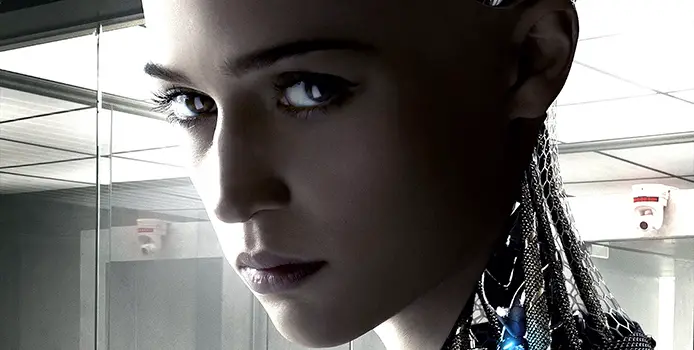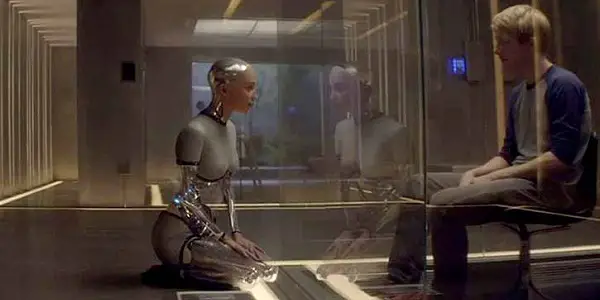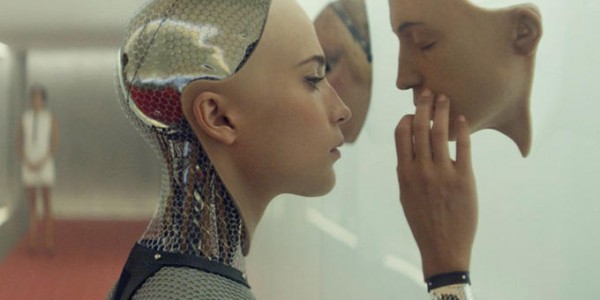EX MACHINA: A Frightening Depiction of A.I.

David is a film aficionado from Colchester, Connecticut. He enjoys…
In recent years, the subject of artificial intelligence in movies has become more and more prominent, perhaps because our own technology has become increasingly advanced in that direction. It may not be long before we have created our own race of conscious, intelligent beings. Until then, though, it is always fascinating to surmise about the idea. And Ex Machina is a sci-fi that does just that. Though not the only film this year to tackle the subject (Age of Ultron and Chappie also focus on it), it is perhaps the most original, and despite its lethargic pace, the most engaging as well.
A tense, intelligent sci-fi
Ex Machina is a film that often feels tensely claustrophobic. The reason for this is because the sequence of events take place almost entirely within a research facility in the middle of the woods, owned by Nathan Bateman (Oscar Isaac), a genius, eccentric inventor. Unbeknownst to the outside world, Nathan has recently been successful in creating a hyper-intelligent robot. He invites Caleb (Domhnall Gleeson), a web programmer, to stay with him at his house in order to perform tests on the robot, named Ava (Alicia Vikander), which would determine if she functions as a true AI. As time goes by, Caleb becomes smitten with Ava, who is not only intelligent but also sexually captivating and flirtatious.

Ex Machina is that type of rare sci-fi that focuses more on tone than on hard science. The claustrophobic setting and chilling soundtrack create an otherworldly effect that, for some reason, kept reminding me of 2013’s Under the Skin. Although that film dealt with the subject of extra-terrestrials instead of AI, it had a similar disjointed feel to it, as if the director was trying to place the audience inside the head of a non-human being, creating a perception of reality that is wildly different from our own. Personally, I enjoyed both films, but I did find Ex Machina to be far more accessible to a general audience, because although similar in tone, it is far less existential in its presentation.
Another film that Ex Machina might be compared to is the 1927 classic Metropolis, which is considered to be the first film to deal with the subject of artificial intelligence. Ava herself, as female, even appears to resemble the robot Maria from that film. Though the stories themselves are vastly different, I always enjoy it when a director pays homage to a sci-fi classic.
Characters drive the story
In a film dealing almost solely with three characters, it’s no surprise that they each excel at their respective roles. Oscar Isaac, who is fast becoming one of my favorite modern actors, is phenomenal as Nathan. Although obviously smart, Nathan’s appearance and demeanor at times seem more like the local drunk at a townie bar. To even further resemble the role, he is also a serious alcoholic, which makes you wonder how he ever created anything as brilliant as Ava in the first place.

Ava herself is a timid, yet seductive creature, played with wide-eyed wonder by Alicia Vikander, who for some reason has an almost Natalie Portman-like allure. And our main protagonist is Domhnall Gleeson‘s Caleb, the most straight-laced and normal of the three, who is not entirely without wits but also possesses his fair share of naivety. The interview sessions between Caleb and Ava are easily the most memorable of the film. In a darkly-lit room, separated by glass, the two discuss everything, from their past experiences to their future dreams. Ava has the mind of a child but the body of a woman, and this stark contrast often provokes some interesting altercations through their conversations.
A not-too-distant future?
Ex Machina is, above all, a frightening prediction of the potential future of AI. Much of the discussions between Nathan and Caleb deal with the subject of consciousness, especially when it comes to the sexuality of Ava. Is this the future of mankind, where we can now create artificial romantic partners rather than have to set out into the dating world and meet someone? Further, should we even have the right to create artificial life in the first place? And if we do, what rights do they have in comparison to the average human? The implications are frightening, but somehow not too far-fetched, especially when you think of the types of virtual experiences that already exist in today’s world (the Oculus Rift, for example).

Perhaps the best aspect of the film is that it merely touches on these complicated questions but doesn’t fully answer them. There is a frightening turn of events by the conclusion, for sure, but it’s left ambiguous whether the ends justified the means. Either way, Alex Garland is clearly interested in the idea, and Ex Machina may even go so far as to create discussions around it.
Conclusion
Alex Garland’s Ex Machina is a chilling view of the future of AI, brought to captivating life through the performances of Isaac, Gleeson, and Vikander. It is a brilliantly wrought work, which although somewhat predictable by the time it reaches its final act, is just about justified in its journey to get there. For any serious lover of sci-fi, this is not a film to be missed.
So what did you think of Ex Machina? What are some of your favorite movies that deal with the subject of AI?
(top image source: A24)
Does content like this matter to you?
Become a Member and support film journalism. Unlock access to all of Film Inquiry`s great articles. Join a community of like-minded readers who are passionate about cinema - get access to our private members Network, give back to independent filmmakers, and more.
David is a film aficionado from Colchester, Connecticut. He enjoys writing, reading, analyzing, and of course, watching movies. His favorite genres are westerns, crime dramas, horror, and sci-fis. He also enjoys binge-watching TV shows on Netflix.













